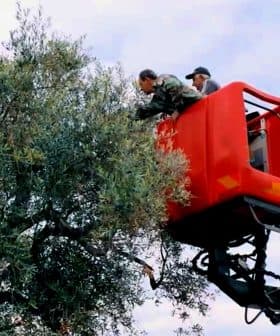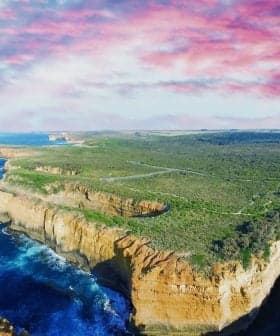Europe Inaugurates Climate Dashboard for Olive, Grape and Wheat Farmers
The new dashboard will provide short-term weather and long-term climate data to help farmers plant new groves, anticipate future challenges and prepare better for pests and diseases.
The completion of the European Union’s Med-Gold project has made a vast volume of climate and weather data available to farmers and olive growers in the Mediterranean region, enabling them to access information on productivity, diseases, and farming strategies. The Med-Gold dashboard, developed with the collaboration of various experts and organizations, aims to help farmers mitigate the effects of climate variability, adapt to climate change, and improve sustainability in their production practices.
After four years, the European Union’s Med-Gold project has been completed, and the data is now publicly available.
Small, medium and large farmers and olive growers throughout the Mediterranean region now have access to a vast volume of data on climate, weather, diseases, expected productivity and farming strategies from multiple authoritative sources.
An efficient climate service supports decisions and adaptation actions, curtails risks, improves resilience, and, when possible, transforms climate change into opportunity.
This information, available on a seasonal basis and as long-term projections, may also allow entire production chains to invest in improvements and policymakers to target interventions better.
The Med-Gold dashboard, which allows farmers to participate in the Med-Gold community and use Med-Gold climate services, is a technological and strategic answer to the challenges posed by climate change in the region.
See Also:Time Running Out to Prevent Worst Impacts of Climate Change, U.N. Says“The new tools developed by the Med-Gold community, with the collaboration of European agri-food companies and technological experts, might greatly enhance the ability of farmers to mitigate the effects of climate variability and to adapt to climate change,” Luigi Ponti, a researcher at the Casaccia Research Center of the Italian Agency for New Technologies, Energy and Sustainable Development (ENEA) and member of the Med-Gold scientific coordination team, told Olive Oil Times.
ENEA has also acted as project coordinator bringing together agricultural researchers, climatologists and computer scientists.
According to its creators, one of Med-Gold’s most significant achievements is providing climate services focused on farmers’ land, allowing them to view precise seasonal forecasts and long-term climate projections.
“An efficient climate service supports decisions and adaptation actions, curtails risks, improves resilience, and, when possible, transforms climate change into opportunity,” said Alessandro Dell’Aquila, an ENEA researcher and member of the scientific coordinating team. “Med-Gold services not only aim at better yields but also improve sustainability.”
This means that olive farmers can predict pest or disease outbreaks more accurately and quickly target treatments or pre-emptive mitigation strategies. They can also estimate the current season’s production potential and know when to deploy fertilizer or irrigation interventions in their groves.
Farmers may determine how productive a specific area will be in the next 20 or 30 years or which kind of pathogens may be expected in the long term.
They can also know which olive varieties are expected to perform better at given latitudes or altitudes or how climate conditions will affect the new trees, informing their decision on how to plan the new groves.
The dashboard will also provide olive farmers with information about how productive their groves may be in the future compared to the present and whether rainfed groves may require irrigation.
“The new tools not only sustain climate adaptation strategies but also pave the way to build on opportunities triggered by weather events caused by climate change,” Ponti said.
“One such example is short-term heatwaves,” he added. “When they occur in specific periods of the growing season, their effect on an olive grove can be likened to a specific treatment against the olive fruit fly, which cannot stand temperatures above a certain level for more than a few days.”
Knowing when such heatwaves might hit can offer new planning opportunities to farmers.
According to the technological partner of Med-Gold, Lutech, the heart of the project is “to transform climate data into projections, trends, economical analysis, good practices and advice, innovative solutions and other services connected to the climate that can be useful for society as a whole.”
In a note, Lutech explained how the technological platform considers the needs and contributions of many different users, the specificities of multiple data and resources and the added value created by the users’ participation in the Med-Gold community.
During a two-day presentation of the Med-Gold dashboard, researchers, community members and agrifood experts explored the new tools with the participation of several institutions, including the International Olive Council and the Food and Agriculture Organization of the United Nations.
The unique climate trends and the prevalence of olives, wine and cereals were cited as the reasons for inaugurating the project in the Mediterranean basin.
Experts believe that the region constitutes a climate hotspot, where climate change phenomena might follow different or even accelerated paths compared to other areas.
“What climatologists have discovered is that southern Europe is a very specific climatic hotspot, where climate change effects are especially evident and happen more quickly than elsewhere,” Gianmaria Sannino, an oceanographer and director of the climate modeling and impact lab at ENEA, told Olive Oil Times in a September 2021 interview.
Ponti also emphasized how the strong interest shown by several international organizations is related to the unique conditions of the Mediterranean basin, which is experiencing a range of different consequences as a result of climate change.
“It is also a biodiversity hotspot at a bio-cultural level, which means ecosystems diversity and how they interconnect with what the human species has done through millennia,” Ponti said. “It means socio-economic diversity and how resources have been used and reached a critical level of exploitation, which is how the many different civilizations that inhabit a narrow strip around the Mediterranean Sea have acted.”
“On top of that, the region’s transitional climate between a tropical and temperate climate must be considered, so that any balance is very uncertain and fragile,” he added.
That is the reason olives, wine and cereals are the three starting fields of application that Med-Gold developers have been focusing on to develop new tools to enhance their resilience to climate change.
Med-Gold experts have met with many different stakeholders of other sectors not directly involved in developing the new tools through a series of workshops.
“They all told us how relevant it is for these new means to enter the field as a standard for production, just has it happened with many other things, such as the integrated phytophagous pest management,” Ponti said.
“When well implemented and based on solid scientific research, production standards can effectively design the path for an agricultural sector,” he added. “Should they become more a part of olive growing, it would be very positive.”
Ponti also emphasized how relevant the possibility of targeting the new services to the end-user’s specific needs is. These end-users become part of the community and add value by participating in the platform, adding their own data points.
While any stakeholder can easily access the Med-Gold community, the project workshops have shown how producers’ organizations and farmers’ associations in the olive sector can play a pivotal role by introducing growers to the dashboard and offering technical experience and guidance to support their full integration of the new climate services.
“As it emerged during our last two-day meeting, while it is relevant to deploy the new means for the current farming practice, it is also equally relevant to work on education and training,” Ponti said.
The idea is to bring the new tools and the ones that could be further developed to the next generation of farmers.
“If tomorrow’s farmers are open to fully using the available information, they will probably integrate this approach into their normal work, with no need to wait for a climate disaster to start saying that all of this can be useful,” Ponti concluded.
Share this article









